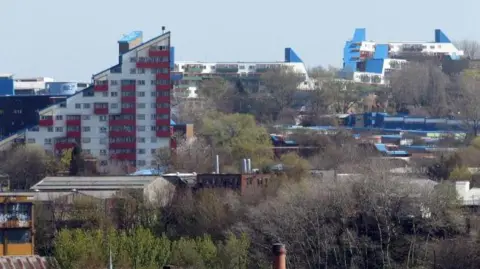In a significant development in the Newcastle area, residents of the Byker Estate are set to receive substantial energy bill refunds, a result of their new appeal to local authorities. These refunds come on the heels of complaints regarding inflated heating costs that had severely impacted the community. The Newcastle City Council, which manages the local district heat network, announced the decision to reimburse homeowners after residents urged for action against the exorbitant fixed monthly energy bills that had been as high as £200. This announcement marks a crucial turnaround in how heating costs are managed in the neighborhood.
The Byker Estate utilizes a centralized heating and hot water system that sources its energy from a facility located on Walker Road. However, residents have long been charged flat rates rather than paying according to their actual energy usage, leading to fierce dissatisfaction and financial strain. Many locals, including 67-year-old Roberta Davidson, faced dramatic increases in their energy bills. Ms. Davidson reported that her monthly heating costs had surged from £108 to £213, starkly illustrating the financial burden placed on homeowners compared to tenants living in the estate’s social housing.
The council’s recent decision means that rebate amounts will average approximately £646.49 per household. Residents will now receive credits ranging from £276.94 to £821.40, potentially covering up to 36% of their previous energy expenses from 2024/25. Davidson expressed astonishment at the council’s turnabout, stating that she never imagined they would take such decisive action: “Never in a million years did I think it would happen, we thought it would never come,” she reflected. Her sentiments were echoed across the estate as many residents celebrated the news of the refunds.
Local Green Party Councillor Nick Hartley commented on the refunds, characterizing them as a triumph of collective action. “By backing residents and raising this with the powers that be, we’ve made a successful case to bring down unfair bills and achieve significant reimbursements for residents,” he stated. This situation represents not just a financial relief for the residents but also a broader acknowledgment of the issues surrounding energy pricing and management in local government.
The city’s authorities explained that the refunds were made possible due to lower-than-expected gas prices, leading to an overcharging of residents in recent years. The council clarified that the refunds would be applied to existing heating accounts, to help mitigate any outstanding balances and reduce future payments. Furthermore, it was confirmed that they did not profit from the Byker District Heating Network, indicating that the scheme operated on a not-for-profit basis.
The situation also highlighted the implementation of a new reconciliation process, suggesting that the council is now more equipped to ensure equitable billing in the future. Historically, the costs required to run the network exceeded the payments made by residents, a factor that had contributed to the current billing discrepancies. With reforms in place, local leaders hope to create transparency and trust among residents regarding their energy expenses.
Overall, this decision not only signifies a win for the Byker Estate residents but also exemplifies the importance of community engagement in local governance. As more homeowners are set to receive their refunds, the response from the council is likely to strengthen the relationship between local officials and constituents. The Byker Estate’s experience serves as a case study on the power of collective advocacy and the need for responsive policymaking in addressing the pressing concerns of residents.











